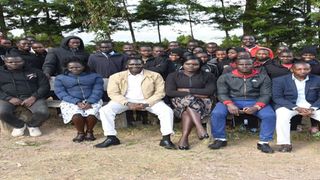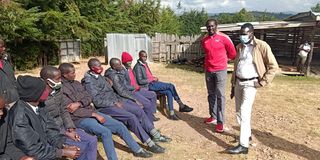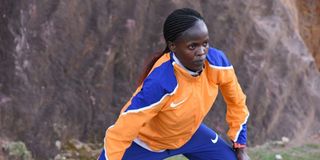
National Olympic Committee of Kenya president, Paul Tergat (fourth left), his acting secretary general Francis Mutuku (second (right), teachers and students of Kapsait Athletics Mixed Secondary School in Elgeyo Marakwet County, including World Under-20, 5,000m champion Zakayo Edward (left), World Under-20, 3,000m finalist Zena Chemutai (right), pose for a group photograph on January 18, 2021.
| Jared Nyataya | Nation Media GroupOther Sports
Premium
Kaptabuk and Kapsait schools: Running and learning to keep cross-border peace
What you need to know:
- Hostilities between communities in the region reduced partly because of athletics and shared facilities
- Last week, the Nation Sport team of Elias Makori, Jared Nyataya (photojournalist) and Bernard Rotich spent some time in Kapsait to soak in the ecosystem and work ethic around Kenya’s women’s world marathon record holder Brigid Kosgei. Today, we look at how coach Erick Kimayo and Gabriele Rosa used Kapsait Nike Training Camp and athletics schools to help keep the peace between the Pokot and Marakwet people
When Gabriele Rosa set foot in Kenya 31 years ago, seeking to help develop athletics talent, there was growing tension between the Pokot and Marakwet communities.
Rosa -- a cardiologist and sports medicine specialist, who in 1981 founded Centro Marathon, a sports clinic in Brescia, Italy, that is part of his Rosa Associati stable -- saw an opportunity to use sport in peace-building, setting aside funds for the construction of the Kaptabuk Primary School.

Edward Zakayo (right) is served porridge by John Ondabwa during a break on January 29, 2019 at Kapsait Athletics Secondary School in Elgeyo-Marakwet County.
Then, in 2004, Rosa’s protégé and renowned coach Erick Kimaiyo came up with the idea of opening a secondary school, the Kapsait Athletics Mixed Secondary School in Elgeyo Marakwet County, to absorb running talent from the Kaptabuk school that Rosa had founded in West Pokot County.
“At that time, the Marakwet and Pokot were not very friendly to each other. I decided to build the training camp at Kapsait which is at the border between the Pokot and Marakwet communities, to help create some peace,” Rosa explains.
“I decided to support the school in Kaptabuk, in Pokot - and I’ve done a lot for the school - and now the two tribes are not fighting in that area, partly because of athletics.
“Kimaiyo wanted that, after primary school in Pokot, junior athletes would be selected to train and study at Kapsait in the secondary school.
“Kimaiyo’s and my idea was to have a camp for juniors and to discover athletics talent because Kapsait is far from everywhere and its easier for athletes to focus there.
“Now I’m happy because we have a primary school that has produced many athletes – from both the Pokot and Marakwet communities – and a secondary school that has also produced world class athletes from across the borders, along with the training camp which I regard as the best in the world, because 3,000 metres above sea level is incredible.”

National Olympic Committee of Kenya President Paul Tergat and the athletes’ representative at the committee, Humphrey Khayange, talk to student athletes at the Kapsait Athletics Mixed Secondary School on January 18, 2021.
Hilly
Kapsait area is quite hilly, but when the athletes want to do fast training, then they have the option of going down to flat areas nearby like Kachibora or Ziwa.
“So you have all the facilities you need to improve the endurance and speed of athletes,” explains Rosa.
“I have many training camps, but Kapsait is the most important one because in Iten, Kapsabet or Kaptagat there are many camps by many companies, but in Kapsait, there’s only one training camp.”
Kimaiyo pays glowing tribute to the late Eldoret Diocese Catholic Bishop Cornelius Korir who fought relentlessly for peaceful co-existence between the Pokot and Marakwet communities.
Annually, Bishop Korir, together with Kitale’s Bishop Maurice Crowley, held a special New Year’s Day Peace Mass at Kapsait to foster the good neighbourliness, something Kimaiyo feels ought to be taken to the next level now.
Bishop Korir also helped build a church on the foot of Kapsait hill to be used by both Pokot and Marakwet communities, besides encouraging dairy farming projects that helped bring harmony at the border around Lelan and Kapsait.
“We need to pick up from where the late Bishop left and look for something that would unify us like he did in ending the animosities,” he says.
“Because there are many jobless youths and we haven’t created enough employment opportunities – it’s inevitable that if nothing is done, these youths will revert to stealing cattle, goats and get into crime because they are desperate for money.”
With the primary and secondary schools that he and Rosa helped put up now in place, Kimaiyo seeks to see at least a polytechnic coming up in the area.
“Deputy President William Ruto used to visit this place each year. He needs to now build a polytechnic where the Pokot, Marakwet and even Turkana, Samburu and people from Trans Nzoia can congregate and learn as one people instead of them seeking education in faraway Eldoret or Nairobi,” he pleads.
“This will help keep the people united and away from the insecurity that we used to witness.”
Meanwhile, Rosa’s love affair with Kenyan athletics started in 1990 when legend Moses Tanui - at the time was based in Italy - approached him for medical and technical assistance.
At that time, there were only three Kenyan men in the top 100 rankings of world marathon running, namely Ibrahim Hussein, Douglas Wakiihuri and Daniel Nzioka.
Currently, Kenyans dominate the rankings with 35 in the men’s top 100 and 28 in the women’s top 100, led by Kapsait product Brigid Kosgei.

Brigid Kosgei from Kapsait Nike Athletics Training Camp in Elgeyo Marakwet County, stretches after an evening training on January 20, 2021.
“I pushed Kenya to run the marathon because when I came to Kenya, no-one was interested in running the marathon but now, Kenya is the most important nation in marathon in the world, and I think this is as result of my projects, mainly opening the training camps and encouraging athletes who were not too good on the track to take up marathon running,” Rosa reminisces.
“At the time the only good track athletes were Moses Tanui and Paul Tergat – I told Tanui when he approached me that, yes, I’d like to be in Kenya, but to push marathon running.”
Together with Tanui, Rosa also started the Discovery series of cross country and road races in 1991, with the Discovery Cross Country Championships celebrating its 30th anniversary in Eldoret this Sunday.
Saturday: At Kapsait, coach Erick “Commando” Kimaiyo’s daily training programmes are tough, spontaneous and unpredictable.





